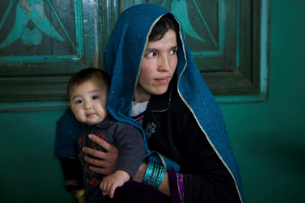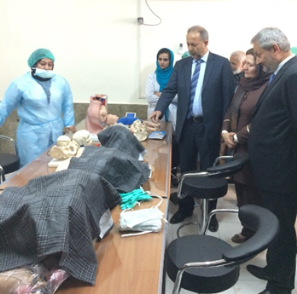 Kabul 15 May 2017 - With the support of WHO, the Ministry of Public Health (MoPH), the Ministry of Higher Education (MoHE) and Kabul Medical University (KMU) inaugurated a centre for pre-service training in Basic Emergency Obstetric and Newborn Care (BEmONC) at the Shahr-Ara Teaching Hospital in Kabul in April 2017 to strengthen care provided to pregnant women and newborns.
Kabul 15 May 2017 - With the support of WHO, the Ministry of Public Health (MoPH), the Ministry of Higher Education (MoHE) and Kabul Medical University (KMU) inaugurated a centre for pre-service training in Basic Emergency Obstetric and Newborn Care (BEmONC) at the Shahr-Ara Teaching Hospital in Kabul in April 2017 to strengthen care provided to pregnant women and newborns.
The centre serves as a competency-based, hands-on theoretical and practical skills teaching site for 4th and 6th year students of KMU. After completion of the 3-week training, graduates are expected to manage normal delivery and postpartum care for mothers and newborns, as well as identify and address signs of complications and provide referrals when necessary. Endorsed by the Ministries of Public Health and Higher Education, the training curricula is based on WHO and national standards.
WHO supported the Kabul Medical University in training OB/GYN faculty lecturers, developing the BEmONC training curricula and conducting 12 batches of training for students in 2017. WHO also provided support for the renovation of the training centre at Shar-Ara Hospital and provided essential non-medical equipment and supplies. Together with MoPH, WHO fostered close partnerships with UNFPA, UNICEF and USAID/HEMAYAT who delivered training models and newborn care units to support the project.
 The training centre was inaugurated in the presence of Ministers of Health and Education, Honorable Dean of KMU, representatives of MoPH, Shahr-Ara Hospital, KMU faculty, HEMAYAT, WHO and national media. In his opening remarks H.E. Minister of Public Health Dr Ferozuddin Feroz thanked WHO and partners for their support and commitment to reducing maternal and child mortality in Afghanistan through strengthened healthcare.
The training centre was inaugurated in the presence of Ministers of Health and Education, Honorable Dean of KMU, representatives of MoPH, Shahr-Ara Hospital, KMU faculty, HEMAYAT, WHO and national media. In his opening remarks H.E. Minister of Public Health Dr Ferozuddin Feroz thanked WHO and partners for their support and commitment to reducing maternal and child mortality in Afghanistan through strengthened healthcare.
“Delivering quality and equitable health services and reducing maternal mortality are among the key priorities of the Ministry of Public Health. Our experience in the integration of the Integrated Management of Childhood Illnesses (IMCI) training package in the curriculum of the Kabul Medical University in 2014 proves that teaching during the pre-service period has a low cost and it empowers young doctors with the skills and knowledge required for quality patient treatment and management as soon as they are employed.”
“Investing in pre-service education is as important as other key public health interventions, as well as being a long-term sustainable response to the mounting healthcare needs in the country,” said Dr Richard Peeperkorn, WHO Country Representative. “The advantage of BEmONC in pre-service education approach is that it can be integrated with existing teaching programmes and there is no need to create a new structure. Our focus now is on joint support to further strengthening OB/GYN and paediatric residency programmes.”
This is a second competency-based pre-service training package which is integrated in the KMU teaching curricula. In 2014, WHO collaborated with MoPH, MoHE and KMU in integrating IMCI training in KMU teaching programme and supported the training of 400 students in 2015.








